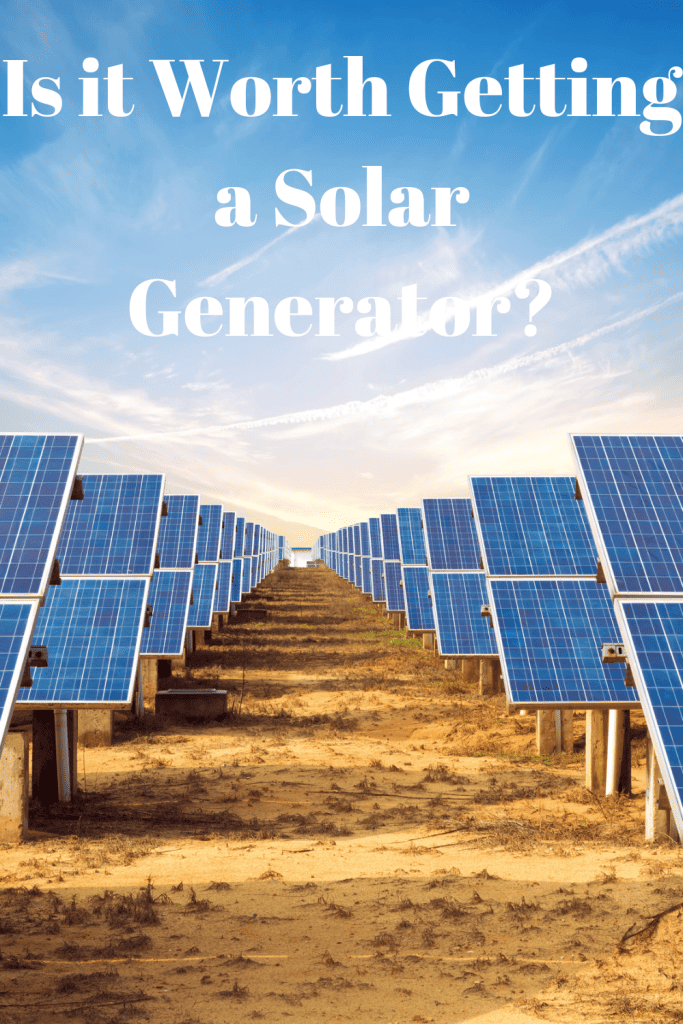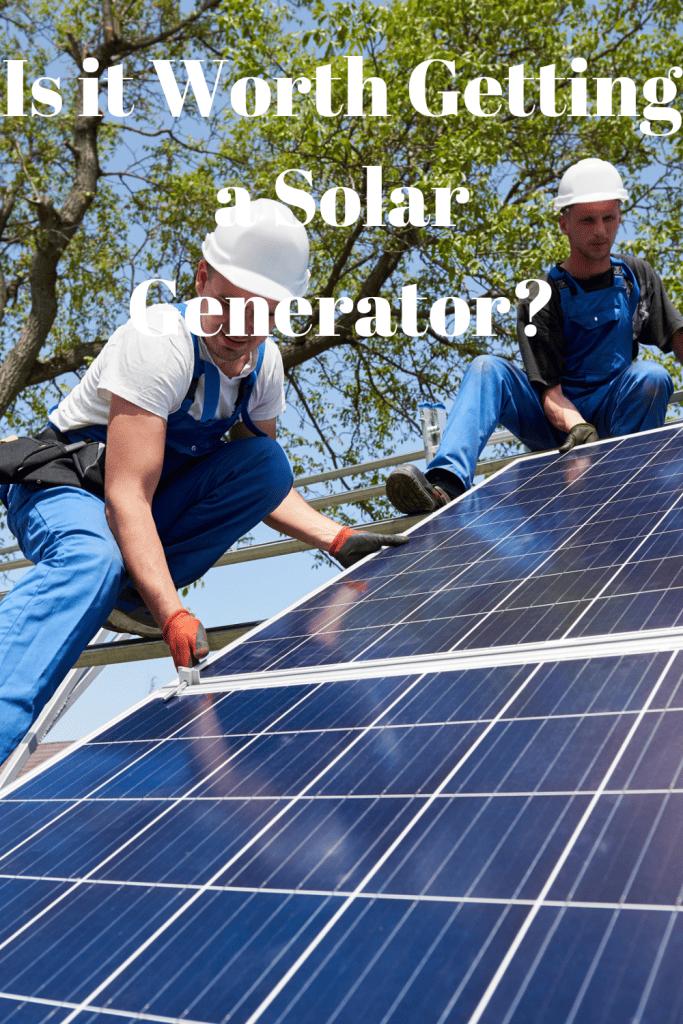
Is it Worth Getting a Solar Generator?
Solar generators are portable power stations combining high-capacity rechargeable batteries with portable solar panels to provide backup power in an emergency, or for camping, tailgating and DIY projects.

These devices can charge various appliances and equipment, including CPAP machines and room air conditioners, while being more lightweight and portable than gas-powered generators.
Cost
Purchase of a solar generator may seem expensive initially, but its initial investment can save money over time in terms of long-term savings and reduced emissions from conventional fuel generators. Furthermore, solar generators require no moving parts and operate silently with little maintenance needed; their price depends on which size and capacity model is selected for your home.
Once you know the power requirements for your appliances, the next step should be calculating how much electricity is necessary. Solar generators typically produce 2000 watts, enough for most appliances and lights. However, it’s important to remember that total output may not always reach its full efficiency due to shade, temperature changes, or gradual panel degradation; so adding extra margin is recommended in your calculations.
Another important consideration when purchasing a solar generator is the battery capacity. This determines how long and how many devices it can power simultaneously. Most solar generators come equipped with either lead-acid, lithium-ion or saltwater batteries; those made out of lithium and saltwater typically last much longer while providing more power density than their lead counterparts.
Last, but certainly not least, you should also keep weight considerations in mind when purchasing a solar generator to ensure it can be easily transportable during camping or hiking trips. A lighter generator means greater portability; less space taken up by storage. Most solar generators feature USB ports or AC outlets so multiple devices can be charged simultaneously.
If you are shopping for a solar generator, make sure it features high battery capacity and quality components to recharge appliances in an emergency or while outdoors. There are even solar generators which can power refrigerators for some hours at once!
Environmental impact
Solar generators offer an eco-friendly alternative to gas-powered generators. They’re quiet and require minimal upkeep compared to gas generators; don’t emit harmful gases into the atmosphere and don’t require filling with fuel or replacing air filters; self-regulating systems using renewable energy like sunlight enable longer use. Furthermore, solar energy provides sustainable power solutions in remote locations where traditional sources aren’t accessible.

One of the primary advantages of solar generators is that they’re free to operate. Though initial equipment investments may be required, once installed they generate electricity free from fuel costs – making solar generators an eco-friendly alternative that’s sustainable enough for both homeowners and emergency situations alike.
Solar generators are smaller and lighter than their gas counterparts. Their lightweight portability makes them perfect for camping trips or other outdoor activities; some models even feature built-in USB ports and 12-volt sockets to make charging devices simple and some come equipped with luggage-like pull handles for easier transportation. Furthermore, solar generators boast large battery capacities capable of running appliances for hours on end.
Solar generators reduce the risks associated with conventional gas generators, namely inhalation of toxic fumes that come out of them and cause health issues ranging from respiratory diseases and cardiovascular conditions, all the way through to heart conditions. Solar generators on the other hand emit no noxious fumes so are safer options in enclosed spaces.
Solar generators also benefit our planet by not relying on water-intensive fuels such as diesel or gasoline to run. Burning fossil fuels creates water pollution that threatens global food and drinking supplies; solar generators rely solely on sunlight as fuel, thus conserving our water resources while mitigating climate change effects.
Practicality
Solar generators can provide an alternative power source that can power appliances, lights and other electrical devices when electricity goes out. Their portability also makes them a suitable choice for RVing, camping and boating trips. When choosing one for yourself it is important to compare its storage capacity, wattage capabilities and charging times against what devices will need powering at once.
Solar generators also boast lower maintenance requirements than gas-powered units, due to fewer moving parts that could develop mechanical issues over time. Furthermore, they produce no harmful emissions and operate more quietly.
if you are purchasing a solar generator, it is recommended that it has a lithium-ion battery. These are much more durable and water proof than lead-acid ones, plus can hold their charge longer making them the superior choice for outdoor use.
Keep an eye on the depth of discharge (DoD). This indicates how much energy has been depleted from your battery over time, which will affect its overall performance and take longer to recharge than fully charged ones.
If you plan to use your solar generator in an environment with low sunlight levels and frequent cloud cover, make sure to periodically clear its panels of snow accumulation. This will enable it to draw in more sunshine and increase efficiency – which helps make solar generators suitable for winter usage even though sunlight is often diminished and sometimes blocked out by clouds.
Latest trends
Solar generator manufacturers have recently made strides to enhance safety and ease of use with the latest trends. Some models now incorporate technology that allows their generators to shut off automatically when reaching capacity – this will prevent overheating and extend device lifespan; other innovations include adding ports that can charge various devices such as smartphones and tablets; finally many are also including digital display technology that shows clearly how much energy has been stored or generated by each unit.

Now more than ever before, technological innovations are making solar generators more convenient and versatile than ever before. Some of the top models on the market feature built-in chargers that can charge multiple devices at once – particularly helpful for people traveling often. Furthermore, solar generators are quieter and less polluting than their gas counterparts making them suitable for people wanting to avoid noise pollution and noise pollution.
Lithium-ion batteries have become a growing trend in solar generators, as their use provides greater reliability, longer lifespan and easier maintenance than their lead-acid counterparts. Unfortunately, however, their cost tends to exceed lead-acid batteries.
Consider what power requirements you will require of a solar generator before purchasing one. Battery size plays a key role when selecting an appropriate model; professionals should make sure their choice has enough juice.
Solar generators are compact and portable, making them the perfect companions on camping trips or outdoor excursions. Additionally, solar generators offer backup power during emergencies while being safer, cheaper and less likely to break than gas-powered models with multiple moving parts.
No matter their advantages, solar generators aren’t suitable for everyone’s needs. They aren’t suitable for powering large appliances during an outage and don’t provide instantaneous power like traditional gas-powered generators because their batteries need time to charge up. However, companies like Goal Zero now sell solutions that operate more like traditional gas generators; their Haven 10 manual transfer switch, for instance, can back up up to ten circuits at a time with just the flip of a switch!
